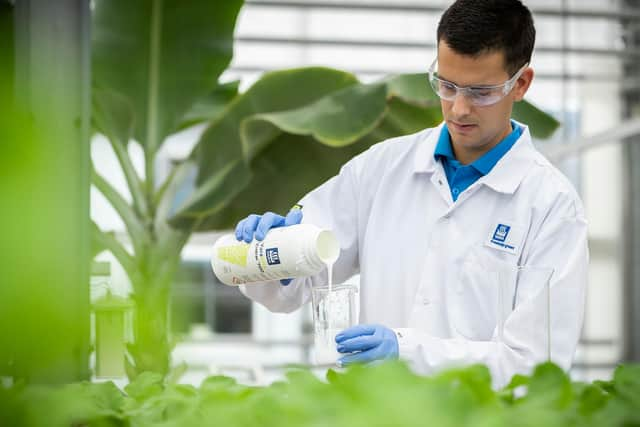Fertiliser giant Yara to open a major new production site at Howden by the end of 2025
The Norwegian-headquartered fertiliser maker says it helps feed 265 million people globally – and in a world that is increasingly short of food. It has 17,500 employees in more than 60 countries and reported revenues of $24bn. Closer to home, it has ten import cargo handling terminals across Britain but its only UK production facility is at Pocklington, east of York.
Yara’s Yorkshire roots go back to a company known as Phosyn, which was founded in 1967 and by 2006 it had become part of Yara International. In 2019, the company entered the bio-stimulants sector, an area which will be further enhanced when Yara opens a major new facility at Howden, East Yorkshire, by the end of 2025.
Advertisement
Hide AdAdvertisement
Hide AdThe plant will double Yara’s current production capacity of its YaraVita speciality crop nutrition products and bio stimulants.


Virtually all the output from the plant will be exported to markets around the world.
“As a global company with production plants and employees all over the world, Yara could have built this plant anywhere, but we chose the UK,” Jari Pentinmäki, managing director of Yara UK, says.
“What began in Yorkshire is set to stay in Yorkshire for the next exciting leg of the Yara journey,” says David Tomkinson, operations director of Yara UK and son of the founder of Phosyn, John Tomkinson.
Advertisement
Hide AdAdvertisement
Hide Ad“We have seen sales of YaraVita specialty crop nutrition products and bio stimulants grow five-fold in the last 20 years.”
Crops need 16 different nutrients, the big bulk of those is nitrogen, phosphorous and potassium – known as NPK minerals after their chemical element symbols.
The YaraVita speciality portfolio covers those other micronutrients. If nitrogen is applied at up to 200 kilos a hectare, these are applied at between 0.5 to 2 litres per hectare.
However, the micronutrients are crucial. If one is lacking or under stress, crop growth, yield and quality can be reduced.
Advertisement
Hide AdAdvertisement
Hide AdPentinmäki says: “Agriculture is now under extreme pressure due to the need to become more sustainable and to be able to respond to climate change.
"Our mission is to responsibly feed the world and protect the planet. Fertilisers have enabled population growth and without fertiliser, the truth is that we would starve. We have calculated that our business feeds 265 million people so we have a real responsibility.
"Food is grown in places where the natural conditions are not favourable and the future is about how we can produce more with less land.”
Yara has grown over the years through several acquisitions of poorly performing competitors. It is also a difficult market for new entrants as the capital investment in each nitrogen-based fertiliser plant runs into billions of pounds. Yet its value objective is shifting from production to knowledge.
Advertisement
Hide AdAdvertisement
Hide AdPentinmäki says: “The greatest value comes from how the fertiliser is being used.
"How do we increase the efficiency of nutrients?
"How do they behave in different environments for different crops?
"That’s when we started to invest in R&D and the need for a UK operation became greater.”
This article originally appeared in The Yorkshire Post’s sister title Yorkshire Business Insider